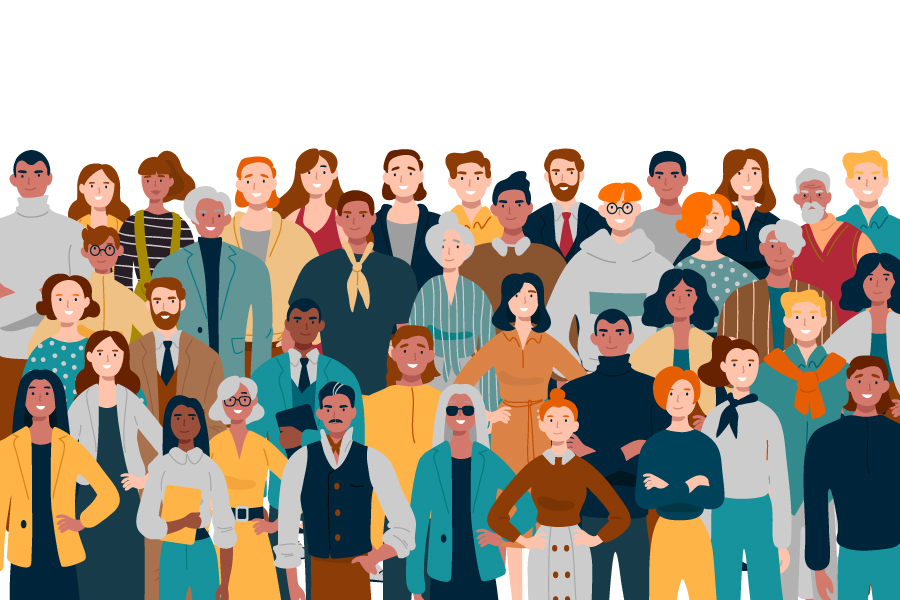Today’s business world embraces the idea of people forming tribes—groups defined not by traditional demographics but through a common purpose—as a new form of consensus thinking that reflects the changing, leadership-starved societies. Tribes identify as social groups under mature and self-aware leaders, with members sharing goals, establishing and following a set of rules, sharing a common culture, and working collectively to defeat their competitors.
This issue’s Thought Leaders share their thoughts on why contemporary businesses should evolve around purpose and embrace those who seek purposeful change, as well as on how tribal thinking drives sustainable change and promotes values such as empathy, inclusiveness, solidarity, and adaptability.
Corporate Responsibility Committee
Chair: Pakis Papademetriou, Athens International Airport
Members
Nickolas Angelopoulos, Interamerican
Rania Assariotaki, The American College of Greece
Chrysoula Diakatou, Public Affairs & Communications Strategist
Manos Iatrelis, V+O Communication
Nicole Ioannidi, Vodafone Greece
Vasiliki Kapari, Wella
Martha Kesisoglou, Eurobank
Kiara Konti, EY
Marilena Kouidou, Coteco Consulting
Siana Kyriacou, KPMG
Alexia Macheras, AB Vassilopoulos
Olga Manou, Loulis Mills
Nikos Melios, Ethos Lab
Manina Menidiati, Citi Greece
Angeliki Papadopoulou, Kaizen Gaming
Sevi Sfakianaki, MSD
Rania Soulaki, Hellenic Petroleum
Melina Thomaidou, AbbVie
Ioannis Vrachatis, Club Hotel Casino Loutraki
Coordinator: Angela Boyatzis
This Thought Leaders section features as a topic Tribes, in line with AmCham’s upcoming hybrid 18th annual CR conference, scheduled for October 19, 2020 at the Hilton Hotel in Athens.

Tribes: A New Era of Collaborative Mindset
By Pakis Papademetriou, Chair of AmCham’s CR Committee
The ongoing Covid-19 pandemic has highlighted the need for a revised global business model: economies that serve to support society as a whole and not the other way around. The utopia of global socioeconomic cohesion and solidarity is emerging as a vision for the future. If responsibility and sustainability were key to protecting planet and people prior to Covid-19, now surely they must be part of the recipe for recovery. The demise of globalization has given birth to a new social order: The world is no longer a global village, but a theatre of disparate groups of people bound by common purpose.
We live in a post-demographic world where behavioral patterns can no longer be predicted by age, education, or location. People grow into groups of shared mindsets through underlying common threats, challenges, and aspirations. Diversity in identity goes beyond identities of age or origin to include additional identities of the cultural communities that individuals aspire to belong and contribute to.
There is a new notion of community around the world that is realized within tribes, groups of people connected through a common purpose, connected to one another and connected to an idea. And thanks to the internet and social media that ensure distance is no longer a limiting factor for people getting together and exchanging ideas, forming tribes is now easier than ever.
Tribes are based on difference, rather than sameness
This new form of collaborative thinking is non-divisive, as it creates a matrix of coinciding purpose-driven interests that feed societal growth. Tribes are based on difference, rather than sameness. Old tribes were built on sameness and were thus closed to others to protect their individual members, usually resulting in confrontation and isolation. By contrast, the new tribes put individual differences at the service of collaboration and are open to others and interlinked with other tribes in a multiplicity of networks that enable individuals to work together.
Shared action is the driving force behind collaborative economics. As is the case with people from around the world uniting for causes against climate change or racism, people came together as a direct result of the Covid-19 pandemic. This crisis triggered a new common purpose for individuals and businesses alike, leading to the formation of new tribes.
Tribes for business is a new form of consensus thinking that reflects the changing societies. In a sustainability-driven era, contemporary business needs to evolve around purpose and embrace those who seek purposeful change. Brand and corporate message is no longer about market segments bound by age, income, or education—it is about convincing tribes bound by purpose. Tribe members can be consumers, employees, investors, or any stakeholder group interested in the business.
Embedding a tribal mindset into core business strategy is now part of contemporary purpose-driven business: adopting sustainability values that bring people together. The new mindset of a collaborative economy, based on groups sharing a common culture, requires an equal playing field on which differences are valued rather than rejected, as well as a strong common interest that motivates people along the context of possibility creativity occurs.
Business cannot force motivation upon individuals, nor engineer creativity. But what organizations can do is to capture collective energy and create contexts of possibility. The collective energy of tribes sparks new ways of innovation generation within the business, enabling mechanisms for a better exploitation of current business and even allowing the modification or even creation of new business models.

Purpose: Not Just Another Business Jargon Buzzword
By Dimitris Agrafiotis, Corporate and Government Affairs Manager in Greece, Mondelēz International
When people want to highlight the importance of purpose, they ask why a business exists; yet, I am afraid this question hides the real nature of purpose. The right question should ask why a business’s existence is important and meaningful.
Purpose is the ultimate statement about the positive change we want to bring in the world and why we exist beyond just improving the financial results. In a nutshell, it’s all about what we stand for as a company, an organization, a community.
Purpose is not a declaration of intentions but rather the transparent and sincere expression of commitment to the greater good
Purpose matters because it’s all about making a difference. In a world that is changing faster than ever before people need to look beneath the surface and focus on the deeper aspects of a company’s activity which is not limited to the achievement of high profitability. This is not new wisdom, but currently it has become more relevant than ever. A few decades ago, Peter Drucker, often revered as the father of management, said that “Profit is not the purpose of a business, but rather the test of its validity.” I am not sure whether in the past this was one of his most popular quotes, but today people are all eyes and ears about what companies and brands stand for.
The integration of purpose into a strategy must reflect an organization’s values, internal strength and passion. Purpose is not a declaration of intentions but rather the transparent and sincere expression of commitment to the greater good which also enhances the long-term prospects and potentials of a company. Consumers are increasingly turning to companies to tackle things that they care about, such as climate change, social, racial and gender inequality, solidarity, diversity, and inclusion. They want to see companies and brands step up and become part of the solution.
Purpose makes the difference and changes the course of a company in a positive way. Purpose led companies have higher growth rates and, according to various studies, outperform competitors that focus only on financial figures. Along with purpose comes innovation, new opportunities, courage, and creativity. Furthermore, employee engagement also shoots up which translates to greater job satisfaction, higher talent retention, higher productivity, higher customer satisfaction, better NPS, and more relevance in the lives of consumers. Purpose driven companies will find themselves associated with people who believe in principles that unite and advance the communities.
Those who do not determine their purpose will continue to survive in the short term, but over time, their stakeholders, including consumers, will eventually demand more than a positive balance sheet or just a quality product.
Purpose doesn’t necessarily make things easier for a company, but it definitely makes them clearer. Purpose doesn’t liberate from performance pressures, but in the long-term, it creates more sustainable results. Purpose isn’t the responsibility of a specific function or CSR. It is everyone’s job, and everyone has to contribute if we want to make it succeed. If we let purpose become just another business jargon buzzword, we risk losing a great opportunity to achieve meaningful, tangible, people-centric change.
At Mondelēz International our purpose matters. We bring our purpose to life by empowering people to snack right. We lead the future of snacking around the world by offering the right snack, for the right moment, made the right way.

Tribes: Actors of change!
By Rania Assariotaki, Sustainability Manager, The American College of Greece
Over hundreds of thousands of years, humans have evolved to seek affiliation through families and tribes that share beliefs, establish internal rules, and afford members a sense of safety and belonging. These groups come together around common causes, ideas and rituals, work towards common goals, and unite to face common enemies. Tribes have evolved over time across all societal areas including the business sector, where tribes are often social groups brought together by a leader, common culture, or organizational boundary, with tribe members frequently sharing a sense of hope and the instinct of collaboration in working towards the same purpose or striving to overcome the same challenges.
There is an imperative need for leaders to develop new ways of thinking and of approaching challenges
In today’s uncertain, complex, ambiguous and fast changing context, there is an imperative need for leaders to develop new ways of thinking and of approaching challenges. Tribal leadership is the key to leading with purpose as it goes beyond hierarchies and individual aspirations.
Listening to the needs and creating a rapport with stakeholders is crucial for organizations to be better able to anticipate risks and opportunities in time to adapt their strategies to the changing market.
But it is also important to connect with the members of the organization, as leaders look for allies instead of followers. New ways of working often involve the creation of teams that are made up of people from different parts of the business with very different skillsets and perspectives. Thus, leaders should create a shared vision and harness the team’s full potential. A diverse and inclusive team will be better equipped to tackle challenges, resulting in faster and more creative solutions, which will benefit both the organization and the society.
The high impact leader mindset requires cognitive, behavioral, and emotional development to refine self-awareness, empathy, openness, ability to develop trust, and respect for differences. This highlights and encompasses the transforming role of academic institutions as educators of the “leaders of tomorrow” by empowering them to become knowledgeable, sensitized, and responsible citizens of the world. This can be achieved by infusing tribal and high impact leadership in their curriculum and all aspects of student life.
In addition, effective leadership is a powerful enabler of collaborations and partnerships. By grappling with problems through collaboration with stakeholders, and even with perceived competitors or adversaries within the market, business leaders can make a significant impact.
In the words of Jeffrey Sachs, founder and director of the UN Sustainable Solutions Network: “Our most basic goal is a thriving life for all, what the ancient Greeks called eudaimonia. We can achieve that by combining our head and heart, our science and our decency, to bring about a world that is prosperous, inclusive, and environmentally sustainable. Businesses that are oriented toward public benefit have a huge role to play in building the future we want.” Tribal leadership can help us get there.

Feeding the Tribe: Catering to Greece’s Health Conscious Consumers
By Dimitra Daskalaki, Organizational Development and Communications Director, METRO AEBE
Consumers have changed. The demographics-based consumer clustering that retailers and FMCG companies have traditionally employed is now rendered naïve at best and can lead to erroneous conclusions. People sharing similar socioeconomic characteristics, for example, may seek entirely different things in their lives. Brands need to focus on ways to meaningfully cluster consumer groups in order to communicate in a more effective and influential way.
At My market, a supermarket chain with 225 stores across Greece, we have identified a key tribe, a target group that is defined not by its demographic characteristics but by shared values of health and wellbeing and a focus on mindful eating and healthier life choices, even when no one else is present. These people are not health freaks nor are they super fit. They are ordinary people who happen to be very interested in the wellbeing of their families and themselves. Naturally, they do not represent the majority of the market, but they form a distinct group and are highly influential, better educated, often with higher disposable income, and seek value and quality beyond the ordinary monetary criteria.
It is a relationship built on trust; one that, with time, brings incremental corporate value
With customer experience at the epicenter of our operations, and true to our commitment to always strive to explore new ways to enrich and further develop longstanding and trust-based relationships with our customers, in 2019 My market developed the Learn, Eat, Live platform, designed to address those customers who seek a better, healthier lifestyle for themselves and their families.
More than just a communications vehicle, Learn, Eat, Live is a powerful life message to learn what is better for them, to eat mindfully by making healthier choices, and to live well and enjoy life! In a nutshell, Learn, Eat, Live is about caring, with an emphasis on quality, education and choices, and about our persistence to offer the best products possible, help consumers make healthier choices every day, and assist them in their struggle for mindful eating without feeling they sacrifice taste or quality. We are here to address this health conscious, healthy eating tribe and assist modern families in their endeavor to succeed and thrive in today’s challenging world. And this is something that goes further and beyond the typical transactions between a supermarket and its customers. It is a relationship built on trust; one that, with time, brings incremental corporate value. This value is returned to us on a daily basis, from our customers in our stores.
This whole new philosophy does not only revolve around goods and things you can buy from a supermarket; it values happy and fun experiences, education and training, and complements our other services that support the quality of our nutrition and our lives. The Learn, Eat, Live platform bases its communication values on the good that comes of all the small acts of caring and kindness that everyone can perform.
We aspire to make this tribe that focuses on health and wellbeing our willing ambassadors, choosing us as their destination for modern eating in a relationship based on trust—after all, that is our motto: Here you feel trust.

Transformation with a Purpose
By Ada Gianneskis, Communication Director Greece, Cyprus, Bulgaria, IKEA
There is a lot of truth in the nowadays commonly heard phrase “Covid-19 changed everything in business.” At the same time, this assertion conceals several r arbitrary assertions. It is one thing to preach groundbreaking practices and another to amplify incidental circumstances.
Few of us will resist the realism of one simple fact: The pandemic is here to stay for an indefinite period. Be it with or without vaccines and complex medical treatments, we are all dealing with a new normalcy, and this new “ordinary” has obliged us to adapt, to improvise, to set different working benchmarks and practices.
Remoteness fueled a unique oxymoron: Distance facilitated agility; daily tribal rituals enhanced collective empathy.
Different businesses in various countries met with diverse challenges. In most cases, and with a view to maintaining operational continuity at acceptable levels, organizations and individuals accelerated their digital transformation. Top management, influencers and opinion makers championed the notion of a “brave new digital world.” Lockdown became the virtual world of “blitz” innovation.
End of story? Certainly not. The sheer exhilaration of the process gave birth to the myth of universal digital progress. In fact, in many cases people reacted with caution to forced change. Let us focus, for example, on the experience gained from the Greek retail sector. Both employees and customers went the necessary extra mile to maintain business and cover necessary needs. However, the total number of e-shoppers hardly changed. At times of extraordinary circumstances, one will rarely enter uncharted behavioral lands and overcome cultural divides. More often than not, it became apparent that customers (and business systems) were eager to revert to “good” old-fashioned practices.
On the other hand, remote work during lockdown invigorated, at different levels of intensity, the tribal business paradigm. Regardless of the size of the company, new organizational structures took shape in the form of tribal units. Common targets and common practices in pursuit of given tasks facilitated the process. At the same time, people quickly empowered their psychology by instinctively forming second-echelon hives. Identity characteristics, shared experiences, individual habits and personal chemistry forged informal sub-units working for a cause.
This process unleashed a few new challenges for tribal business leaders. It also revealed new roles for tribe members. The leaders realized that harnessing the varying dynamics became a vital priority for business consistency and organizational cohesion. Remoteness fueled a unique oxymoron: Distance facilitated agility; daily tribal rituals enhanced collective empathy. Eventually, the new systemic environment had the opportunity to develop into both a mindset changer and an attitude incubator. Ideas and visions less alluring in ordinary conditions became more attractive. As most companies gradually entered a hybrid normalcy, new structures also fused into corporate ethos.
Sustainable business, climate neutrality, and human rights now have more chances to find their way into the corporate value matrix. Less organizational resistance is expected as visionary goals make more people happy, let alone inspired. Internal and external stakeholders will grab the opportunity to transcend formal attitudes and make a difference in their lives. Businesses and societies will also become aligned as they transform with a purpose. Whatever the outcome, it is worth taking a shot at a more idealistic approach in a world where it became necessary to cry out loud that “Black Lives Matter.” Companies who lead by example have a role in averting the next shout of despair.

A Fundamental Shift in Focus
By Manos Iatrelis, Senior Account Manager, V+O Group
Covid-19 has hit like a tidal wave our lives, our economies, and our modern civilization and brought to the surface our human nature and our vulnerabilities against the forces of nature. Over the last one hundred years, humanity has developed at an exponential pace, making more progress than in the previous one thousand years. Yet for the first time in our digital era, we now face a challenge that, just like the internet, knows no boundaries and, most importantly, affects every country in the same way—a truly global challenge, which for the first time brings global forces together in order to combat it. Governments, institutions, businesses, and citizens are changing long standing practices and adapting policies and behaviors to deal with the crisis.
The way forward to achieving longterm value is serving a greater purpose
Out of it all, a new reality has arisen, especially for business. Since the beginning of the outbreak, we have seen companies across the world and across industries rapidly enforcing enhanced safety measures in order to protect the health and wellbeing of their employees. Almost overnight, the business world shifted from rushing to improve quarterly result indices to defending the lives of their workers, customers, and suppliers and, consequently, protecting their value chains and perhaps their very existence. This was a fundamental shift of focus that stretched the views of business leaders towards showing empathy for people and putting safety first. In front of the emergency, this shift was something that not only citizens demanded but also shareholders agreed with.
Aligned against a common enemy, business leaders took the first but crucial step towards a new path: a new approach of the very purpose of business that shifts from maximizing profits for certain stakeholders to creating value for all stakeholders. The conversation has been going on for many years on a theoretic level and started to take physical form in 2019 with the Business Roundtable’s famous Statement of Purpose of a Corporation letter—signed by 181 CEOs—which set out the vision. Then came Covid-19, turning the vision into necessity, and the discussion about sustainable capitalism is now an evolving issue about the future of business management.
For many years, we have been discussing—extensively through AmCham’s Corporate Responsibility Conference—that the way forward to achieving longterm value is serving a greater purpose and embedding sustainability principles in the core of the business mindset. Covid-19 shifted the focus rapidly to the foundations of sustainable thinking such as protecting the wellbeing of the workforce and acting with empathy in order to keep the trust of the customers. The battle with the pandemic is not yet over, but when it finally is, we will be at a better starting point from which to take on the challenge we have left aside: climate change.

Moving from Measuring Past Performance to Longterm Value Creation: The Importance of Business Tribes in Creating a Shared Purpose
By Kiara Konti, Director, Climate Change and Sustainability Services, EY Greece
Under the disruption caused by Covid-19, most major opportunities and risks that had already started to shape the business landscape prior to the pandemic seem to have now become the leading forces behind global and local recovery plans. The benefits of an accelerated digital transformation, the rapid adoption of climate change mitigation and adaptation plans, the shift from a linear to a circular economy, and the need for integrating environmental, social, and governance (ESG) aspects into corporate strategy are just a few examples that have evolved from prominent market trends to main pillars of the post-Covid-19 economy. The shift from measuring financial and non-financial performance in retrospect to focusing on forward-looking longterm value creation—especially in the post-Covid-19 era—requires added emphasis on redefining the purpose, vision, and mission of businesses through stakeholder engagement.
As reported in the recent EY publication “Why COVID-19 could boost ESG performance and stakeholder capitalism,” at its 2020 Annual Meeting in January, the World Economic Forum (WEF) launched its Davos Manifesto, which stressed the importance of stakeholder capitalism as a response to the economic, social, and environmental challenges the world is currently facing. In the run-up to the launch, Klaus Schwab, Founder and Executive Chairman of the WEF, summarized the fundamental tenets of stakeholder capitalism as follows: “The purpose of a company is to engage all its stakeholders in shared and sustained value creation. In creating such value, a company serves not only its shareholders, but all its stakeholders—employees, customers, suppliers, local communities, and society at large.”
The Covid-19 crisis has created an unexpected opportunity for organizations to rethink what they do and how they do it
By fully engaging with their stakeholders, businesses have the means to create intra- and inter-business tribes that will increase their resilience and grant them a competitive advantage over their peers. Inability to do so can have grave implications, as showcased by the ongoing pandemic. Time seemed to contract when many organizations faced pressing and immediate concerns regarding the health and wellbeing of their workforce, managing revenue loss, and protecting their clients and consumers. Those who were engaged with their stakeholder basis before the pandemic and had already listened to their tribes’ concerns were better positioned to handle the situation more efficiently.
The Covid-19 crisis has created an unexpected opportunity for organizations to rethink what they do and how they do it. Those companies that realign themselves to the stakeholder capitalism agenda and prioritize longterm value creation through ESG frameworks may very well have a competitive advantage in the coming years.

Building Communities of Success: Leveraging Tribal Forces for Employee and Customer Happiness
By Panos Kouvalis, Mobility and Convenience Tribe Leader, Interamerican
In popular culture, tribalism may refer to a way of thinking or behaving in which people are loyal to their social group above all else. In business, tribes are often groups linked by a shared purpose or goal and a common culture.
A group needs only two things to be a tribe: a shared interest and a way to communicate. To influence tribes in organizations, you have to give up control and recognize that every change always goes through a process of localization as it gets executed. How leaders tell the story of a business has tremendous impact on how individuals create meaning and come together.
Serving an organization’s purpose and continually working to remove obstacles facing that purpose leverages the best tribal forces and builds the kind of community that becomes the ultimate testament to business success. People come to work for relationships, personal efficacy, and a sense of purpose; when change can connect with that reality, it starts to get traction. The secret to changing an organization is to understand the fundamental units that make up the social system—these local tribes—and to invert the change process so that tribes own the change.
A group needs only two things to be a tribe: a shared interest and a way to communicate
Leaders must also constantly reinvent themselves and their companies to cater for changing communities, adapting products and services as customers demand. As far as employees are concerned, leaders should foster individuality and independent thinking while encouraging the sense of belonging to a community. And having the right mix of people in your peer group is essential to its success. If everyone has a similar cultural or work background, you’ll miss out on the learning opportunities that come through diversity.
Interamerican’s mission is to support people to live a safer, longer, and better life. After ten years of economic crisis in Greece and the outbreak of coronavirus disease people are facing many challenges trying to take control of their lives. Some are complex, such as taking good care of their health, saving for their retirement, or protecting their homes and businesses. Others are simpler, such as driving with safety.
In order to serve our mission and purpose, we had to stay relevant by moving the boundaries of insurance, creating unique ecosystems of products and related services, with multiple touchpoints, that enrich our customer’s life, making proud all employees and benefiting society.
In the Mobility and Convenience Tribe we create solutions that meet people’s needs and offer more by providing affordable personalized insurance plans in order to deliver daily value on mobility and convenience needs and advance safety in innovative ways. From the employees’ point of view, we build a culture that gives our people the freedom to learn by testing, to think, to grow, and to contribute to our shared ambitions and goals. We want to be active listeners, making decisions based on facts and the in-depth understanding of our customers—a place where happy employees make happy customers.

Tribes, the Drivers of Change
By Siana Kyriacou, Partner and COO, KPMG
It is a strong, innate need for people to belong. This guides us to seek out groups and communities of people where we are understood by our peers, where our experiences, when shared, will be acknowledged, accepted, and appreciated.
The modern tribe goes beyond the anthropological explanation of what a tribe is: a notional form of human social organization usually defined by common descent, language, culture, and ideology.
People that form the tribes of our time come together irrespective of shared backgrounds and shared cultures. They come together by choice, driven and bound together by a shared vision, shared values, and shared purpose. In the majority of times, people today come together in times of great disasters—such as a natural disaster, where the impulse to band together as a group and help out transcends other usually most notable differences such as racial, religious or political—and unite under an idea, a vision and a shared want to contribute, to be part of something bigger.
People look to be part of something bigger, of a greater cause
The role of organizations, and of their leaders in particular, is of great importance in times of great uncertainty and especially on the heels of a financial crisis and a global pandemic bringing about social, economic, as well as political disruptions. People look to be part of something bigger, of a greater cause, and as governments seem more often than not to disappoint and divide people, rather than bring them together, people look to the organizations they have chosen to be a part of to find this inspiration.
People wish to be in an organization that either provides them with a vision and a set of values they can aspire to or one that reflects their values and purpose in life.
The leaders who can take on this challenge, visualize a goal, and communicate it clearly and with passion to inspire and ignite the same passion in others, these are the leaders that will stand out. These forerunners leading the way for change are those that people will follow, contributing towards the cause and working hard to bring it to life. These leaders are the active listeners, those that are open to ideas and suggestions coming from every single member of their organization. These leaders of the new modern tribe are inclusive, giving voice to anyone that shares their vision, promoting solidarity and unity under a common goal, and welcoming all such agents of change, expanding their tribe’s boundaries to include all that wish to join.
What a greater world we would be living in if more people had the motivation to come together under a vision of shared goodness, with an outlook for a sustainable future, and form larger tribes and then nations of change where we would be bound by the higher purpose of contributing to the creation of shared good, rather than the alleviation of shared hardship.
This is where the power of tribes lies in, where each one of us is a driver of change, one person at a time, one tribe at a time, one great wave of change at a time.

Tribes Matter: Redefining Business Purpose for a Better World
By Angeliki Papadopoulou, Corporate Affairs Director, Kaizen Gaming
We comes before I in many aspects. Historically, people formed group structures to survive. Psychologically, sense of self is partially constructed in interaction with others. Ethically, it is the right thing to do. Practically, it is the only sustainable path.
We are living in the times of we, tragically enhanced by the pandemic crisis. Crises, however, do not create new trends, they just accelerate existing ones. Long before the current developments, the signs of a (neo) tribalization process were evident, chillingly close to what all-time media guru Marshall McLuhan predicted back in 1962. According to McLuhan, first came the non-literate, sensory person of the oral-acoustic tribal world, followed by an individualistic, homogenized, generic creature floating into neutral visual-only citizenship. Detribalization led to a world of isolation and distance, taken over by the new electronic reality, where physical time, space and distance have somehow vanished within our virtual everyday moments. Nowadays, not only have we all the right to speak our voice, we also have the space to share it with the rest of the world. Within this social media clatter, noise can start making sense when people find other voices that resonate to theirs, when they start feeling a weird sense of belonging with strangers from diverse cultural backgrounds, gradually forming a family away from family, which—if united under a common cause—may evolve into a modern tribe.
The new purpose driven tribes have a forward looking vision. Right or wrong, they are driven by a mission for a better world.
Tribe is a word with multiple connotations, burdened by decades of anthropological studies and stretched in diverse thematic environments. If there is a common denominator, this would be a sense of nonnegotiable unity, originally marked by tradition and common culture, now scattered in multiple themes. From past to present, defining difference is timeline-related: While indigenous tribes were united through their common past, the new purpose-driven tribes have a forward-looking vision. Moreover, they share a sense of urgency, enhanced by the lack of inspiring or efficient leadership. From environmental issues to work-related topics and from health alarms to social and racial justice themes, these groups are forming out like a cry for action, a crisis mechanism activated by survival instinct. Their collective sparkle is stamped by a higher cause, their interaction is fueled by the human factor. Right or wrong, they are driven by a mission for a better world.
Of course, this new reality has not gone unnoticed in business terminology. Business tribes are employee groups sharing a common leader or purpose and can function as a source of hope and collaboration for the enterprise. Tribal marketing is already identifying consumers based on their collective behaviors, clustering demographically diverse customers according to common ways of thinking, experience and lifestyle. Is this enough? However contemporary this may sound, we still have a long journey ahead to reach the core of this emerging wave. This rationalized approach cannot work; its de-tribalized vocabulary is far from empathic and cannot communicate to the side it is aiming to. The business world should take a step back from charts and stats and see the bigger picture of the world it is a part of. Linking financial prosperity to a global purpose reflects much more than proof of responsibility; it is a solid sign of togetherness, an active stand for our collective future.

Tribes… Writing a New Corporate History
By Melina Thomaidou, Communications and Patient Relations Manager, AbbVie
A revolutionary social construct as a way for humans to increase their odds for survival, tribes have now reappeared as the most dynamic business tool worldwide. In business, tribes have the power to write the story and create a powerful corporate culture. Some of them may underperform due to a lack of vision or drive, but others are able to make a significant change—even change the world! What makes or breaks the tribe? Focus. By focusing on excellence, tribes have the chance to be heard up to the upper leadership levels. What is more, tribal leaders themselves can leverage tribal forces to influence corporate leadership; and that’s exactly how impactful a tribe can be.
What makes a tribe excel or stagnate? The human element. Success requires enthusiastic, inspired people that are willing to support a cause. And what does it take for an idea to be born, to evolve and to be realized? It takes people who can envision being part of something bigger and feel that their collective action can be of significant impact, people who are positive towards life and work and share a passion for innovation, and who are inspired by a leader who comprehends the group. Tribal leadership is key; the situation calls for an ambitious leader who is focused on growing, adapting, and upgrading tribal culture. After all, it is the tribe itself that determines whether changes will work and whether coworkers and stakeholders will join and follow new directions.
Unusual circumstances call for unusual standards of thinking, acting and leading
During the pandemic, corporate tribes emerged as a new imperative due to their ability to create a common purpose for individuals and businesses. Among pharmaceutical companies, who were quick to see into the new needs, new tribes were formed, triggered by the need to adapt to unprecedented circumstances and pioneer change. The companies joined forces against the pandemic to protect people against Covid-19. Led by their tribal instinct, people and companies shared the same goal: to look out for people in need.
For us at AbbVie, the pandemic prompted the discovery and reinforcement of tribal behaviors that would allow us to rise to the challenge. We managed to overcome negative feelings and the uncertainty of the lockdown, shifting from “life sucks” to “let’s be a team and be great.” The goal was to create something that will take the company one step ahead and reinforce the trust of our stakeholders. We broke through the barriers to create tribes that work passionately towards the same cause.
In what could be a good example of tribal mentality, an empathetic tribe of coworkers joined forces to address the needs of health professionals and patient associations during the trying times of the lockdown. The goal was to deliver at home to chronic patients with autoimmune diseases their much-needed therapies. Acting promptly, with a high sense of responsibility and teamwork spirit, the ‘tribe’ achieved in very little time what so far (in terms of formalities and paperwork) had seemed impossible.
Such initiatives are the heart of AbbVie: setting the bar high and believing that people who share a common cause can exceed their potential and achieve the unthinkable. Unusual circumstances call for unusual standards of thinking, acting and leading. Time will tell which ones will shape the new corporate storytelling; however, trusting in people who are bound by purpose is, arguably, one of them.






